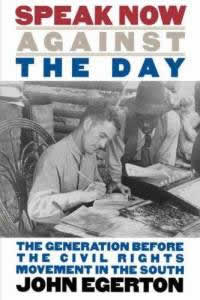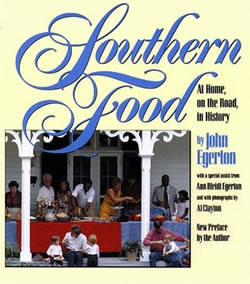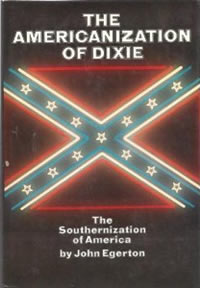The Head of the Table
Remembering the late John Egerton, who loved the South as fiercely as he fought its injustices
My friendship with John Egerton began the day his dog Hitch tried to kill my dog Scout in the street. We were passing the Egertons’ house, which is a few doors down from my own, and the normally mild-mannered Hitch objected to Scout’s incursion into his territory. Neither dog was leashed, and John and I agreed we were idiots for taking a chance like that, even in our quiet neighborhood. But it’s impossible not to love the glory of a dog in full squirrel-harassing run, and the fact that we both kept taking the same chance again and again made us regard each other as co-conspirators, I think, long before Humanities Tennessee launched Chapter 16 and installed me as its editor and John as a member of the editorial board.
 I knew John Egerton the writer long before I came to know John Egerton the neighbor, long before I even moved to Nashville. His 1974 book, The Americanization of Dixie, was familiar to any student of Southern literature or Southern history coming of age during the years I was in college and graduate school. And because his brilliant, genre-defying Southern Food: At Home, on the Road, in History happened to come out in 1987, the year before my husband and I married, we received three copies as wedding gifts.
I knew John Egerton the writer long before I came to know John Egerton the neighbor, long before I even moved to Nashville. His 1974 book, The Americanization of Dixie, was familiar to any student of Southern literature or Southern history coming of age during the years I was in college and graduate school. And because his brilliant, genre-defying Southern Food: At Home, on the Road, in History happened to come out in 1987, the year before my husband and I married, we received three copies as wedding gifts.
Speak Now Against the Day, John’s great 1994 book about the South in the years leading up to the Supreme Court’s Brown v. Board of Education decision, was impossible for any Nashvillian to ignore, even one unfamiliar with John’s eleven earlier books. Its title comes from Faulkner’s response to his fellow Southerners’ outraged reaction to Brown: “We speak now against the day when our Southern people who will resist to the last these inevitable changes in social relations, will, when they have been forced to accept what at one time they might have accepted with dignity and goodwill, will say, ‘Why didn’t someone tell us this before? Tell us this in time?’” Speak Now Against the Day chronicles the slow, inexorable movement toward desegregation in the South, and it was celebrated all over the national media. The New York Times Book Review called it “a stunning achievement: a sprawling, engrossing, deeply moving account of those Southerners, black and white, who raised their voices to challenge the South’s racial mores.” In 1995 it won the Robert F. Kennedy Book Award from the Robert F. Kennedy Center for Justice and Human Rights.
For all this national praise, it was virtually impossible for anyone who knew John in person to reconcile his self-deprecating, soft-spoken demeanor with his status as a literary lion. Meeting the author of Speak Now Against the Day, you might expect to encounter someone who looked less like Mr. Rogers, someone who radiated confidence and accomplishment. But in his own mind, John—who contributed essays and reviews and interviews and even haiku to Chapter 16—remained a journeyman writer. He sent in every assignment with a disclaimer: “Margaret, this feels as shaky as a pillar of Jell-O,” or “I hope I haven’t dragged you off into the quicksand here.”
 Nor was there any apparent ego in his relationships with other writers: he used to call Clyde Edgerton (who is no relation at all) “my famous cousin Clyde,” and he liked to tell about how disappointed his own audience would be when they showed up at readings expecting the comic Southern novelist.
Nor was there any apparent ego in his relationships with other writers: he used to call Clyde Edgerton (who is no relation at all) “my famous cousin Clyde,” and he liked to tell about how disappointed his own audience would be when they showed up at readings expecting the comic Southern novelist.
In conversation, most people wait for the pauses, for a break in the chatter that will give them room to edge in an opinion, tell a story of their own. John had accumulated more stories than he would ever have time to write down or tell at dinner, but he did just the opposite: on meeting someone new, he invariably turned an ordinary conversation into a friendly interview, gently asking questions, encouraging elaboration, nudging for more details. As a result people opened before him, responding to his interest and his obvious delight in them. John’s first book, A Mind to Stay Here (1970), profiles a range of people who, according to the book’s introduction, “differ from the common stereotype” of racist Southerners. They differed from each other, too, but John could talk to them all: old or young, black or white, man or woman, farmer or scientist or lawyer or preacher, the descendant of slaves and the plantation-born patrician alike.
There was such a patent kindness in John, such a profound patience, that no one ever felt foolish in his presence. Many, many people considered John a dear friend, but even more considered him a mentor. Aspiring writers would find in him an encouraging ear and an indefatigable champion. It’s impossible to count how many books over the years owe their existence to John’s advice and literary matchmaking. If you were a debut author with the immense good fortune of knowing John Egerton, you could count on him to help you to improve the manuscript—and then help you find an agent or a publisher for it, too.
 Many readers know John Egerton primarily through his founding of the Southern Foodways Alliance and through Southern Food, a book which attempts, he wrote, “to fill some of the open space that exists between cookbooks that disregard history and histories that ignore food.” Others know his lifelong pursuit of what, in A Mind to Stay Here, he called “racial reconciliation” in the South. But for John these seemingly disparate aspects of his work sprang from the same source: “Not infrequently,” he wrote, “Southern food now unlocks the rusty gates of race and class, age and sex. On such occasions, a place at the table is like a ringside seat at the historical and ongoing drama of life in the region.”
Many readers know John Egerton primarily through his founding of the Southern Foodways Alliance and through Southern Food, a book which attempts, he wrote, “to fill some of the open space that exists between cookbooks that disregard history and histories that ignore food.” Others know his lifelong pursuit of what, in A Mind to Stay Here, he called “racial reconciliation” in the South. But for John these seemingly disparate aspects of his work sprang from the same source: “Not infrequently,” he wrote, “Southern food now unlocks the rusty gates of race and class, age and sex. On such occasions, a place at the table is like a ringside seat at the historical and ongoing drama of life in the region.”
John himself saw his life’s work as a project of chronicling and interpreting “this eccentric and enigmatic region in which we live,” as he explained in an essay for Chapter 16 in 2011. “My forte, so to speak, was foretelling the imminent demise of the South—and all that kept me gainfully employed was its stubborn refusal to die.” But his relationship to the homeland he loved could be vexed, and he was prone to bouts of despair, especially when long-waged and hard-won battles for racial, social, or economic equality were reversed by political fiat.
Talking with John, so mild-mannered and gentlemanly in his collared shirts and soft sweater vests, so judicious in choosing his words, it was easy to forget how fierce he could be, how bravely he spoke the truth in a region that seems at times to have been inoculated against it. It’s not just that he was passionately committed to the cause of civil rights long before most white men in the South could even accept it. It’s that he never slipped into complacency; he never lost his ability to recognize when his fellow human beings were suffering—and to speak often and openly of their suffering when others would prefer not to be reminded. Earlier this year, when The New York Times, riding a wave of fawning national attention, pronounced Nashville the new “it” city and sent a reporter down to consider its marvels, John refused to play along: “People are too smug about how fortunate we are now,” he told the Times. “We ought to be paying more attention to how many people we have who are ill-fed and ill-housed and ill-educated.”
 In the last years of his life, John wrestled with the realization that his own career as an independent historian would not be possible today. A writer in the digital age faces greater hurdles than even those he encountered as a liberal-leaning journalist in the unreconstructed South. He could adapt to changing technology if it suited him—“I use email and Google,” he once told me, “but I’m not on Facebook, and I don’t Twit”—and the success of his books meant that he could afford to write shorter pieces for paltry Internet rates. But a young writer trying to raise a family by words alone, he knew, has a nearly impossible time of it today.
In the last years of his life, John wrestled with the realization that his own career as an independent historian would not be possible today. A writer in the digital age faces greater hurdles than even those he encountered as a liberal-leaning journalist in the unreconstructed South. He could adapt to changing technology if it suited him—“I use email and Google,” he once told me, “but I’m not on Facebook, and I don’t Twit”—and the success of his books meant that he could afford to write shorter pieces for paltry Internet rates. But a young writer trying to raise a family by words alone, he knew, has a nearly impossible time of it today.
Even so, his fundamental optimism always triumphed over despair. “In the best and worst of times,” he wrote last year in an essay for Chapter 16, “a tiny fraction of the population will always aspire to tell their stories; a minute number of writers will actually follow through and complete manuscripts; a mere handful of those in-vitro books will go on to have their own lasting identity; and a small remnant of the surviving volumes, whether printed and bound or digitized and flat-screened, will have enough of a healthy history to be remembered as something more than a flash of light and a puff of smoke.”
I’ve relied on that tempered optimism many times in this job. More than once, in writing this remembrance, I almost picked up the phone to run a sentence by him, to ask him which of two choices made the most sense. Since the founding of Chapter 16, he has been its patron saint, its moral compass, its greatest champion. I don’t know what in the world I will do without John Egerton, but I think I know what he would tell me if he could hear my anguish: “Try not to worry. It’ll all work out. Everything’s going to be fine.”

Margaret Renkl, the editor of Chapter 16, has published widely in both literary and mainstream magazines, including The Southern Review, Shenandoah, Good Housekeeping, Health, and CNN.com, among others. She lives in Nashville.


